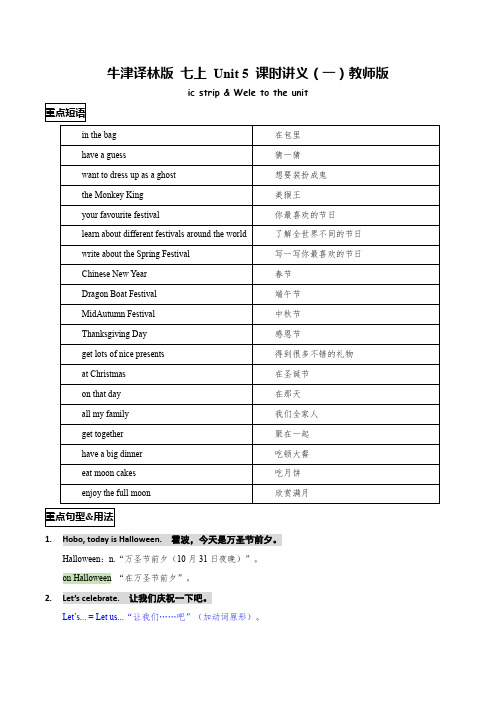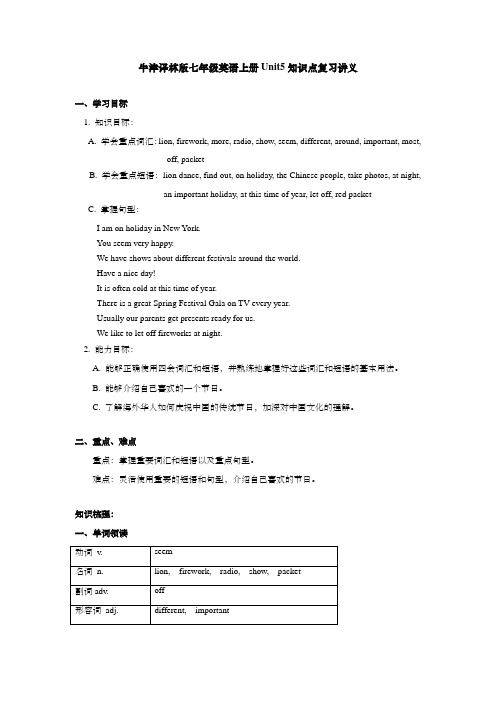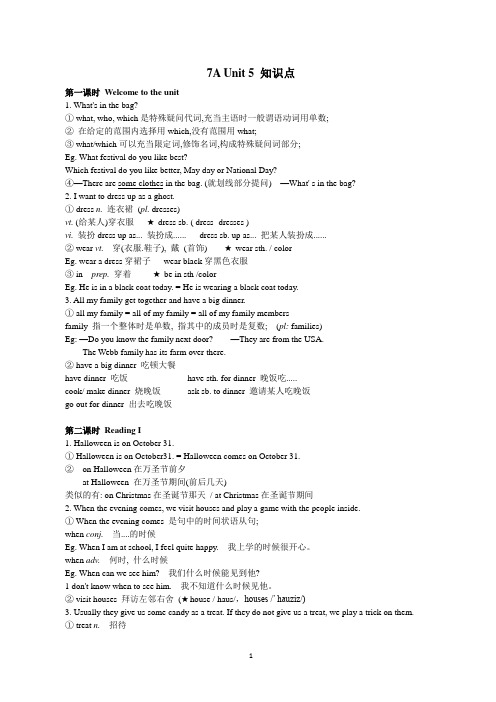2021-2022学年牛津译林版英语七年级上册unit5 shout词汇讲义
牛津译林版七上Unit5课时讲义(一)教师版

牛津译林版七上Unit 5 课时讲义(一)教师版ic strip & Wele to the unit1.Hobo, today is Halloween. 霍波,今天是万圣节前夕。
Halloween:n.“万圣节前夕(10月31日夜晚)”。
on Halloween “在万圣节前夕”。
2.Let’s celebrate. 让我们庆祝一下吧。
Let’s... = Let us...“让我们……吧”(加动词原形)。
celebrate:vi.“庆祝”。
celebration:n.“庆祝;庆祝活动”。
3.Have a guess! 猜一猜!guess:n./v.“猜,猜测”。
三单:guesses。
4.I want to dress up as a ghost. 我想装扮成鬼。
dress up as:“装扮成”。
dress up:“装扮,乔装打扮”。
dress up in:“穿上……打扮”。
辨析:dress/wear/put on/indress:vi.“穿衣”,宾语通常是人称代词或反身代词。
dress sb./oneself“给某人/某人自己穿衣服”。
get dressed:“给自己穿衣服”(= dress oneself)。
【表示动作】be dressed in:穿着……。
【表示状态】wear:“穿着”【强调穿的状态】,宾语通常是衣物。
put on:“穿”【强调穿的动作】,宾语通常是衣物。
in:“穿着”【强调穿的状态】,后接衣服、颜色。
5.That’s not very interesting. 那不太好玩了吧。
辨析:interesting/interestedinteresting:“有趣的;有吸引力的”。
作表语时,主语通常是物;作定语时,既可以修饰人,也可以修饰物。
interested:“感兴趣的,对……感兴趣”。
主语通常是人。
be/bee/get interested in...“对……感兴趣”。
牛津译林版英语七年级上册Unit5单词用法讲解课件

play
a
g让am我e们w在ith公th园e 见pe吧op!lLe eint'ssidmeeet
inside
in your the park!
inside
20.敲 knock 敲门 knock at/ the door 我听I h到ea了r 敲a k门no声ck。at the door.
5.鬼 ghost 一只鬼 a ghost
许多鬼 many ghosts
67..圣节诞日节fCeshtirvisatlm我as在最圣喜诞欢节的(节2)a日tonCmhCyrhifsrativmsotmausraisteDfaeys圣tiv诞al老春人Ft节haethsperriCnghrfiessttmivaasl 8.因为 because 因为我们W在e圣a诞lw节ay总s g是et收a l到ot很of多ni精ce美pr的es礼en物ts 。at Christmas.
请按照你们老师说的做。Please do as your teacher says.
You are as tall as your father. 入乡随俗。When in Rome, do as Romans do. 你和你父亲一样高。
她一边擦黑板一边唱歌。She cleans the blackboard as she sings. 因A为s t树he上ap的p苹les果on太t高he了tr,ee 他ar够e t不oo着hi。gh, he can't reach them.
【新教材】牛津译林版(2024)七年级上册英语Unit 5单词讲义

【新教材】牛津译林版(2024)七年级上册英语Unit 5单词讲义1. Lifestyle常见用法和搭配:Healthy lifestyle(健康的生活方式) Modern lifestyle(现代的生活方式)例句:She adopted a healthier lifestyle after her doctor’s advice. 在医生的建议下,她采取了更健康的生活方式。
近义词:way of life (生活方式), manner of living (生活方式)联想词:1.Habit (习惯,n.)2.Routine (常规,n.)3.Culture (文化,n.)4.Behavior (行为,n.)5.Attitude (态度,n.)2.Cucumber常见用法和搭配:Sliced cucumber(切片黄瓜) Cucumber salad(黄瓜沙拉)例句:She added some sliced cucumbers to the salad. 她在沙拉中加入了一些黄瓜片。
联想词:1. Vegetable (蔬菜,n.)2.Fresh (新鲜的,adj.)3.Salad (沙拉,n.)3. Lemon常见用法和搭配:Lemon juice(柠檬汁)Lemonade(柠檬水)例句: A slice of lemon can enhance the flavor of your tea. 一片柠檬可以增强茶的味道。
近义词:citrus (柑橘,n.), lime (青柠,n.)联想词:1.Citrus(柑橘,n.)2.Yellow (黄色的, adj.)3.Sour (酸的, adj.)4.Fresh (新鲜的, adj.)5.Juice (果汁,n.)4.Watermelon常见用法和搭配:Watermelon slice(西瓜片) Juicy watermelon (多汁西瓜)例句: She loves eating watermelon on a hot summer day. 她喜欢在炎热的夏天吃西瓜。
2021-2022学年牛津译林版英语七年级上册unit5 take photos词汇讲义

Unit5词汇讲义拓展take photostake photos 双语例句1. I braved the cold today myself and got out and about to take a few photos. i冒着寒冷今天我和下车,并即将采取的一些照片。
2. Take photos while traveling and link them to a map precisely at a place they were taken.以旅行时的照片和联系他们的地图正是一个地方,他们被带到。
3. Did you take a lot of photos?你拍了许多照片吗?4. A: Did you take lots of photos when you were in Shanghai?你在上海的时候照了很多照片吗?5. Did you take any photos of the places of interest in Beijing?你拍了一些北京名胜的照片吗?6. I did not take photos as there is nothing worthy taking.我没有拍照片,不知道该拍什么!7. For wxample, you mustn't take photos of the exhibits in the museum.例如,你不能拍摄馆内展品。
8. But I wasn't lucky with taking photos: The one I sent to you is the best from all photos I was trying to take.但我拍的照就不那么幸运了。
(我给你的那张是我所有照片里最好的一张。
9. Reginald: I`ve got some old photos from elementary school. Do you want to take a look?雷金纳:我找到一些小学时的旧照片,你想看看吗?10. And wow, 800mm telephoto is really going let me take great photos, I can shoot something really far away!和哇,800毫米长焦是真的让我带大的照片,我可以拍的东西真远!11. It was forbidden to take photos in this place, for some strange reason.这是禁止拍照在这个地方,一些奇怪的原因。
【最新】牛津译林版七年级英语上册unit5 task 精品课件(共38张PPT)

/ɔf/ let off fireworks; let off=set off
get presents; new clothes and red packets; /’pæ kits/
Millie also likes the Spring Festival best. She writes an article about it. Before she writes the article, she makes a writing plan.
Spring Festival
It is always in January __________ or February ___________. It is often cold
Rules(规则):
If the sentence is right, sit there and say Yes. If the sentence is not right, stand up and say No.
(如果相关句子是对的,坐在位子上,说”yes”; 如果相关句子是错的,站起来,说”no”.)
dress up They_________ They_________ wear masks paint their faces. or___________ They make how pumpkin lanterns. ___________ They play “trick or treat”. ___________ They have a party. ___________
get together families members ____________
have a big dinner watch TV (the Spring Festival Gala)
牛津译林版七年级英语上册Unit5知识点复习讲义

牛津译林版七年级英语上册Unit5知识点复习讲义一、学习目标1. 知识目标:A. 学会重点词汇:lion, firework, more, radio, show, seem, different, around, important, most,off, packetB. 学会重点短语:lion dance, find out, on holiday, the Chinese people, take photos, at night,an important holiday, at this time of year, let off, red packetC. 掌握句型:I am on holiday in New York.You seem very happy.We have shows about different festivals around the world.Have a nice day!It is often cold at this time of year.There is a great Spring Festival Gala on TV every year.Usually our parents get presents ready for us.We like to let off fireworks at night.2. 能力目标:A. 能够正确使用四会词汇和短语,并熟练地掌握好这些词汇和短语的基本用法。
B. 能够介绍自己喜欢的一个节日。
C. 了解海外华人如何庆祝中国的传统节日,加深对中国文化的理解。
二、重点、难点重点:掌握重要词汇和短语以及重点句型。
难点:灵活使用重要的短语和句型,介绍自己喜欢的节日。
知识梳理:一、单词领读二、重点单词【单词学习】1. show ☆☆【用法】名词,意思是“演出,秀”。
可构成短语on show。
show也可以用作动词,意思是“出示,展示,上映”等。
牛津译林版七年级英语上册Unit5知识点讲解

牛津译林版七年级英语上册7A Unit5 重点词组、难点解析、语法复习【词组总汇】1. Let’s celebrate! 让我们来庆祝!Let sb do sth.2. What are you doing? 你在干什么?3. dress up as装扮成……样子dress up as a ghost/ monkey king4. make a display展示,展出5. different festivals around the world 世界各地不同的节日6. have to do sth. 不得不做某事7. Chinese New Year中国的新年(春节)8. Dragon Boat Festival端午节9. Mid-Autumn Festival中秋节10. at Halloween在万圣节11. on Thanksgiving Day 感恩节12. like to do sth. 喜欢做某事13. a letter from sb. to sb. 一封由某人寄给某人的信14. thank sb. for doing sth. 感谢某人做某事Thank you for helping me. 感谢你帮助我。
15. tell sb. about sth. 告诉某人有关某事tell me about your school16. celebrate Christmas庆祝圣诞节17.in the USA 在美国=in America18. have a party举行晚会have a special party 举行一个特殊的晚会19. on October 31st在十月三十一日= on the last day of October20. do sth. for为……做某事21. play a game called “trick or treat”进行一个叫“不招待就使坏”的游戏22. knock on/ at敲(门或窗)23. give sb. sth. as a treat以……招待某人24. play a trick on sb. 对某人使恶作剧play a trick on them25. wear costume with masks 穿带面具的服饰26. paint our faces 给我们的脸涂色27. make our own special pumpkin lanterns 制作我们自己的兰瓜灯笼our own 我们自己的28. cut out切、割29. on the evening of October, 31st在十月三十一日的晚上30. hot drinks热饮31. Happy Halloween! 万圣节快乐!32.the meaning of……的意义33. make sth(成品) out of sth (原料) 用…制成….make a lantern out of a pumpkin 用一个兰瓜制成一个灯笼34. on that day 在那天35. get ready for为……做准备get ready for my birthday 为我的生日做准备P.44-4936.(on) New Year’s Day(在)元旦37. May Day 五一节38.Children’s Day儿童节39.Teachers’ Day教师节40.National Day国庆节41.at Christmas在复活节42.rice dumplings粽子43. at breakfast (lunch/ supper) 在吃早餐(午餐/晚餐)的时候44. read a newspaper 看报45.in Canada在加拿大46.on Monday在周一47.in winter在冬天48. take sb. for a walk带某人去散步= walk sb 带某人去散步49.have a long holiday度长假50. see a doctor 看医生51. go on holiday 去度假be on holiday 在度假52. the person in a special costume 穿特殊服饰的人53. give sb sth =give sth to sb 给某人什么东西54. give me a present = give a present to me 给我份礼物55. at Chinese New Year 在春节56. get some red packets 得到一些红包get sth 得到什么P.50-5557. help sb. do sth. 帮助某人做某事58. Chinese New Year celebrations庆祝新年的活动59. traditional Chinese food传统的中国食品60. lion dance舞狮子61. lots of interesting things 许多有趣的事62. my first time 我的第一次(second 第二third 第三)63. at night在夜晚64. in Chinatown在唐人街65. from 9 p.m. to midnight 从晚上9.00到午夜66.so much如此(多),这么67. ask sb. to do sth. 叫某人做某事68.make flash cards做卡片69.cut out pieces of cards 裁出一张张卡片70.a piece of card一张卡片71. on each card 在每张卡片上72. on the other side of …在….的另一边on the other side of the street 在街道的另一边73. a few seconds 几秒钟74. try to remember the sentence 努力记住这个句子try to do sth 努力做谋事75. in the West 在西方76. put sth. in…把某物放进……77. in many ways 用很多方法78. make a plan制定计划79. go there on foot 步行去那儿= walk there80. writing plan写作计划81. listen to the radio programme听广播节目82. on the Internet在网上83. dream about /of …梦见/梦到/梦想…84. put up…on the wall把……挂在墙上【难点解析】1. celebrate v. 庆祝celebrator n. 庆祝celebration n. 庆祝(活动)2. Let’s celebrate! 让我们来庆祝!Let sb do sth. let, make, help 后跟动词用原形3. 人interested 某人对某事物感兴趣物interesting 事物本身使人发生兴趣4. dress up as …打扮成……be dressed in 穿着(She is dressed in blue她穿着蓝色衣服) dress sb. 给某人穿衣服put on 穿戴(后接要穿戴的东西,强调动作)→take off 脱下wear穿戴(强调状态)5. 用which提问,表示在一个限定的范围内进行选择; 而用what提问不强调限定范围例句: What colour are your shoes?Which colour do you like best , green red and yellow ?6. like doing 表示习惯做某事爱好某事like to do 表示一次性动作like 指喜欢爱好指对某人某事赞许或产生兴趣, 并积极参加活动love 爱好爱,在感情上比like 强烈, 经常用于爱祖国、爱父母等这一类程度较深的情况enjoy 主要侧重于享受某种乐趣后接反身代词(enjoy oneself )= have a good time7. look at 看…… knock at 敲…… shout at 对…..喊叫point at指着……8. receive a letter from …get a letter from …hear from…收到……来信9. called 是call 的过去分词,意为被称作、被叫做,也可以用named来替换,还可用介词短语with the name 来代替10. 1)so 用作副词时,意思“这/那么;如此地”,通常至于所修饰的形容词或副词之前2)so 可翻译为“就像那样,是这样”,为避免重复前面所说过的内容,常与动词hope ,say , think, believe, guess 等动词及I’m afraid 连用说明:1. 如果表示否定,上面用法中要用not 来代替so2. 但在think believe 等词后,仍然用so11. see , look, watch, readsee 表示看到的意思强调看的结果也有明白的意思look 表示看的动作watch 表示观看,后面常接TV match 等词read 主要指看书、报刊、杂志等,强调阅读12. some 一般用于肯定句中,还可用于表示客气、邀请等含义,期望得到对方的肯定回答any 用于否定句、疑问句及条件状语从句中,用于肯定句中表示“任何,无论哪一个”13. plan 现在分词为planning 后常接不定式作宾语plan to do14. holiday 意为假日假期,可单可复当作假期讲时常用复数,on holiday意为度假,在休假15. excited、exciting 两词源于动词exciteexcited表示主语对某事感到兴奋的,感到激动的exciting表示该事物本身令人兴奋的,使人激动的I am very excited to see this exciting film.我很激动看到这令人激动的电影英语中类似的单词还有:interested and interesting ; inspired and inspiring ; surprised and surprising ; encouraged and encouraging ….26. tradition n. 传统、惯例traditional adj. 传统的traditionally adv. 习惯上、按惯例27. Which is your favourite festival ? = Which festival do you like best ?*当询问为什么喜欢某个节日及原由时,我们常用why 引导的疑问句并用because来回答*当询问庆祝节日的方式,应用句型How do you celebrate…….?28. help sb. do sth. = help sb. to do sth.29. cut out 切去,剪去cut down 砍倒cut sth. in half /in two 把某物切成两半30. by the way 顺便问一下in the way 挡道,妨碍on one’s way to …/ on the way to …在某人去…的路上in a way / in some ways 在某种程度上;从某一点上看注意:on the way home , way 后不加to , 因为后面有home31. through 穿过,从…中通过,多指从空间中穿过,从内部的一头到另一头across 横过穿过着重指从一个物体表面的一边到另一边32. Get a treat from sb. Play a trick on sb.33. Sb +will +动词原形+…/ sb +be going to + 动词原形+…一般将来时态34.I like Mid-Autumn festival because I like eating moon cakes (划线提问)Why do you like Mid-Autumn festival? 对because 引导的条件状语从句提问用why35 .Halleween is my favourite festival.=I like Halleween best.我最喜欢万圣节36. play a game called “trick or treat”玩一个不招待就使坏的游戏call 动词call sb +名称称某人为…call me Tom 称我为Tom37.give sb sth as a treat = give ab a treat of sth 用什么来招待某人Give us some candy as a treat = give us a treat of some candy38. People don’t know who we are . 宾语从句用的是疑问词+陈述句语序我不知道你多大I don’t know how old you are.39. What day is it today? 今天星期几? What date is it today?今天几号?40. 时间介词的用法: in + 一段时间(在早上,下午,晚上, 节日, 季节, 月份)on + 具体某一天(日期, 周几, 具体某天的早上)at + 具体时间(时刻, 一天三餐, 某些节日)41. 在早上:in the morning 在春天: in spring 在周六: on Saturday 在10月: in October在一个寒冷的早上: on a cold morning 在每天早上: every morning (前不能加on)在10月31号晚上: on the evening of October 31st42. the person in a special costume 穿特殊服饰的人(对划线提问用which)The girl in a red coat is my sister. Which girl is your sister?43. on each card each +单数名词如果它们作主语谓语动词用第三单人称数44. get ready for 意思是“为……做准备”,后面接名词或代词。
_Unit 5重点知识点梳理 2021-2022学年牛津译林版英语七年级上册

7A Unit 5 知识点第一课时Welcome to the unit1. What's in the bag?① what, who, which是特殊疑问代词,充当主语时一般谓语动词用单数;②在给定的范围内选择用which,没有范围用what;③ what/which可以充当限定词,修饰名词,构成特殊疑问词部分;Eg. What festival do you like best?Which festival do you like better, May day or National Day?④—There are some clothes in the bag. (就划线部分提问) —What' s in the bag?2. I want to dress up as a ghost.① dress n.连衣裙(pl. dresses)vt. (给某人)穿衣服★ dress sb. ( dress- dresses )vi.装扮dress up as... 装扮成...... dress sb. up as... 把某人装扮成......② wear vt. 穿(衣服.鞋子), 戴(首饰) ★ wear sth. / colorEg. wear a dress穿裙子wear black穿黑色衣服③ in prep. 穿着★ be in sth /colorEg. He is in a black coat today. = He is wearing a black coat today.3. All my family get together and have a big dinner.① all my family = all of my family = all of my family membersfamily 指一个整体时是单数, 指其中的成员时是复数; (pl: families)Eg: —Do you know the family next door? —They are from the USA.The Webb family has its farm over there.② have a big dinner 吃顿大餐have dinner 吃饭have sth. for dinner 晚饭吃.....cook/ make dinner 烧晚饭ask sb. to dinner 邀请某人吃晚饭go out for dinner 出去吃晚饭第二课时Reading I1. Halloween is on October 31.① Halloween is on October31. = Halloween comes on October 31.②on Halloween在万圣节前夕at Halloween 在万圣节期间(前后几天)类似的有: on Christmas在圣诞节那天/ at Christmas在圣诞节期间2. When the evening comes, we visit houses and play a game with the people inside.① When the evening comes 是句中的时间状语从句;when conj. 当....的时候Eg. When I am at school, I feel quite happy. 我上学的时候很开心。
- 1、下载文档前请自行甄别文档内容的完整性,平台不提供额外的编辑、内容补充、找答案等附加服务。
- 2、"仅部分预览"的文档,不可在线预览部分如存在完整性等问题,可反馈申请退款(可完整预览的文档不适用该条件!)。
- 3、如文档侵犯您的权益,请联系客服反馈,我们会尽快为您处理(人工客服工作时间:9:00-18:30)。
Unit5词汇讲义拓展shout英 [ʃaʊt]美 [ʃaʊt]第三人称单数:shouts第三人称复数:shouts现在分词:shouting过去分词:shouted过去式:shoutedshout 基本解释及物/不及物动词呼喊,叫喊; 高声说或发出喊叫声名词大叫; 呐喊; 大叫着说shout 相关例句及物动词1. The commanding officer shouted his orders.指挥官高声发出命令。
2. He shouted himself hoarse.他喊叫得嗓子都嘶哑了。
不及物动词1. He is rather far away, but if you shout, he may hear you.他在相当远的地方,但是如果你大声喊的话,他可能听得见。
2. He shouted with pain.他痛得大叫。
名词1. The shouts of the crowd flustered the spokesman and he did not know how to deal with the situation.人群的叫声使演讲者感到紧张,不知道怎样来处理这种局面。
shout 情景对话在公共汽车上A:Stand back from the door, please. There’re plenty of seats in the rear.请离开门边,后面有许多座位。
B:What’s the fare, please?请问票价是多少?A:One yuan fifty cents. Drop it in the box here.1 元5 角,把它放进箱子里。
Unit5词汇讲义拓展B:Is this the right bus to Zizhuyuan Park?这是去紫竹院公园的汽车吗?A:Take a No.2. This is No.12.应该乘2 路车,这是12 路。
B:But somebody told me this was the right bus to take. I want to go to Tian’anmen Square, you see.但有人告诉我是坐这趟车去天安门广场。
A:Then this is the right bus. Move on, please. You’re holding up the passengers. Tian’anmen Square is the last stop but one.是这趟车,请往前走,您挡住了其他的乘客。
天安门广场在倒数第二站。
B:Would you please let me know when we get there?到站的时候您能告诉我一下吗?A:Sure thing. I’ll shout it out.确切的说,到的时候我会大声喊的。
Lift FurnitureA:Could you help me lift some furniture, Marie?你能帮我搬一下家具吗,玛丽?B:Sure, what would you like me to do?当然可以,你想让我做什么?A:Well, first, you could go upstairs and grab the yellow key.首先,你上楼去拿那把黄色的钥匙。
B:The one on the table?桌子上那把吗?A:Yes. Then, you could come back down and unlock the spare bedroom here.对。
然后你下来打开这儿的备用卧室。
B:Then what would you like me to move?接下来你让我搬什么呢?A:Do you think you would be able to move this chair into the room by yourself?你觉得你可以自己把这个椅子搬到房间里吗?Unit5词汇讲义拓展B:Sure, not a problem.没问题。
A:You might want to stretch your legs a bit. You don’t want to hurt yourself. And make sure you bend your knees so you don’t hurt your back.你也许要稍稍伸伸腿,你不想弄伤自己吧。
要记住曲膝,这样就不会伤到背部。
B:Good idea. Any thing else you’d like me to move?好主意,你还需要我搬其它东西吗?A:Just a few things—the television, the blue lamp, and the coffee table.还有几件—电视、蓝台灯和咖啡桌。
B:Is that all?就这些吗?A:That’s it. I’ll be upstairs.Shout if you need anything.就这些。
我马上就上楼,你如果需要什么就喊一声。
shout 网络解释1. 叫:同时最好确定自己知道在您交谈(Chat) 或喊叫(Shout) 时,距离多远的人可以「听」得见您说的话. 当您加入某个团体后,就会看到和整个团体的成员交谈的功能. 而物品栏中的姿势(Gesture) 也是另一种与人沟通,或为您说的话增添效果的好方法.2. 大叫:野蛮人:野蛮人的战嗥技能经常会被忽视无论如何,与别人组队时,千万记住,战嗥可以发挥很大的效果您可以使用大叫(Shout)来增强队友的防御力同一支队伍当中的野蛮人,应该专精于不同的武器类型(例如一个擅长剑术,一个擅长斧头等等)如此一来,3. 喊叫:当您使用一般的交谈(Chat) 功能时,离您20 公尺以内的人可以听到您说话,喊叫(Shout) 的范围则为100 公尺. 您还可以直接传送即时讯息(IM,Instant Message) 给别人或整个团体(Group) 的成员,无论他们在Second Life 世界的哪个角落.shout 词典解释1. (通常指生气时或希望远方的人能听见时而)大叫,嚷,高呼If you shout, you say something very loudly, usually because you want people a long distance away to hear you or because you are angry.e.g. He had to shout to make himself heard above the near gale-force wind...在呼啸的大风中他得大声喊叫才能让别人听见。
e.g. 'She's alive!' he shouted triumphantly...“她还活着!”他欢欣鼓舞地大声叫道。
Unit5词汇讲义拓展shoutingOne of my grandchildren heard the shouting first.我的一个孙子首先听到了喊叫声。
2. 成功在望;有成功的机会If you say that someone is in with a shout of achieving or winning something, you mean that they have a chance of achieving or winning it.e.g. He knew he was in with a shout of making Craig Brown's squad for Japan.他明白自己有望为日本建成克雷格·布朗之队。
3. (酒吧中)该你/我做东了If you are in a pub and someone you are with says 'It's your shout' or 'It's my shout', they mean that it is your turn or their turn to buy a round of drinks.相关词组:shout downshout outshout 英英释义noun1. a loud utteranceoften in protest or oppositione.g. the speaker was interrupted by loud cries from the rear of the audienceSynonym: cryoutcrycallyellvociferationverb1. use foul or abusive language towardse.g. The actress abused the policeman who gave her a parking ticketThe angry mother shouted at the teacherSynonym: abuseclapperclawblackguard2. utter aloudoften with surprise, horror, or joye.g. `I won!' he exclaimed`Help!' she cried`I'm here,' the mother shout ed when she saw her child looking lostSynonym: exclaimcrycry outoutcrycall outUnit5词汇讲义拓展3. utter in a loud voicetalk in a loud voice (usually denoting characteristic manner of speaking)e.g. My grandmother is hard of hearing--you'll have to shout4. utter a sudden loud crye.g. she cried with pain when the doctor inserted the needleI yelled to her from the window but she couldn't hear me。
